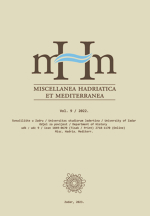Rumunjsko-jugoslavenski odnosi, od sukoba do suradnje (1948. – 1964.)
Romanian-Yugoslav Relations: From Confrontation to Cooperation (1948 – 1964)
Author(s): Anatolie Bajora, Bogdan-Tudor ConstantinovSubject(s): Diplomatic history, Economic history, Political history, WW II and following years (1940 - 1949), Post-War period (1950 - 1989), History of Communism
Published by: Sveučilište u Zadru
Keywords: Romania; Yugoslavia; Stalinism; Titoism; inter-communist relations;
Summary/Abstract: This article examines the evolution of the Romanian-Yugoslav relations from 1948 to1964. The study explores two different periods in the relations of these two countries. The first period was from 1948 to 1953, when the Soviet-Yugoslav and Roman-Yugoslav conflicts occurred, practically constituting a precedent that would gradually ruin the unity of the socialist camp. The second period (1954 – 1964) corresponds with the beginning of the normalization, bringing Bucharest and Belgrade even closer and aiming to satisfy their national interests and counterbalance the policy of the superpowers. Ideological divergences and the need for socio-economic development were reflected in the character of the foreign policies of the two countries, which were under a strong influence of interventions from inside and outside the communist bloc.
Journal: Miscellanea Hadriatica et Mediterranea
- Issue Year: 2021
- Issue No: 8
- Page Range: 133-148
- Page Count: 16
- Language: English, Croatian

